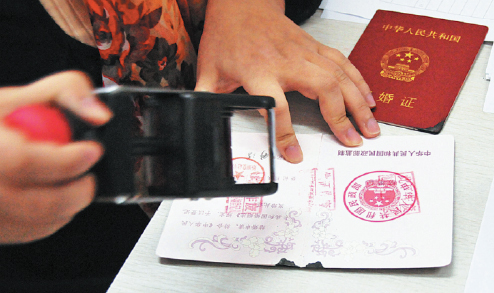
 Living
Living
Amicable split

A staff member seals a couple's divorce certificates at a marriage registration center in Harbin, Heilongjiang province, in 2013. ZHANG QINGYUN/FOR CHINA DAILY
In late March, Li, the Chengdu woman, who is in her 50s, visited Hu to seek advice, even though she had already filed a divorce application and had no problems with her partner concerning child care and property allocation.
"However, she lost her temper at the time, repeatedly saying she had become fed up with a life filled with arguments, but also complaining about her anger with her husband," Hu said.
"She also used bad language when referring to 'the other woman' involved in the case, telling me she wanted her husband to lose his reputation and account for his misconduct."
Recalling Li's irrational and emotional state, Hu, also a mediator and marriage mentor with considerable experience of resolving domestic conflicts in Chengdu, said it was understandable, adding that it is not uncommon to see such behavior among older clients seeking a divorce.
"Many of them, including Li, find it hard or are reluctant to end their marriages and family life, into which they have put decades of effort. They cannot help pouring out their bitterness, and they also experience mood swings when the day finally comes to end their marital relationship," Hu said.
During the cooling-off period, Li asked Hu for help about 10 times. "After getting the divorce certificate, she told me the new policy was necessary, as it gave her the time to address her mood swings and end the marriage in a decent manner, instead of chaotically," Hu said.
She added that domestic disputes are best resolved rationally and peacefully, otherwise they may deepen and even result in incidents such as violence.
"The cooling-off period does not mean stifling marital freedom. The aim is to make couples think twice before divorce, and to prevent irrational or impulsive separations," Hu said.
Unprecedented drop
After the policy took effect, China witnessed a historically low number of divorces in the first quarter of this year.
However, Guo Rui, who works for Lyu Yuan, an institution working with the civil affairs bureau in Xicheng district, Beijing, that provides legal and psychological services relating to marriage, is not overly optimistic about such a decline.
From January to March, 296,000 couples were divorced in China, a 72 percent drop compared with the fourth quarter of last year and nearly a 52 percent fall year-on-year, according to Ministry of Civil Affairs data published last month.
Before the national statistics were released, dozens of cities, including Hangzhou, capital of Zhejiang province, and Nanchang, the Jiangxi provincial capital, issued their own data, which showed similar decreases.
Some media reports viewed the decline in the number of divorces nationally as a success in slowing marital terminations, but Guo said it is too early to draw such a conclusion.
"The decrease might be connected with the cooling-off period, but there's no hard evidence to prove it resulted from the policy, as such cases in the first three months of this year should include those separating through litigation," said Guo, whose institute also helps elderly residents protect their rights.
The policy is only applicable to couples who agree to end a marriage, not to all situations. Some extreme cases, including domestic violence, family abuse and drug use, are excluded from the policy. Parties in such circumstances can sue for divorce in court.
Guo said further research and observations are needed to gauge the policy's impact on the divorce rate.
Hu, from the Yuanshi Law Firm, agreed. She said some couples, such as those applying for divorce in March but finally getting certificates in April, might not have been included in the figures.